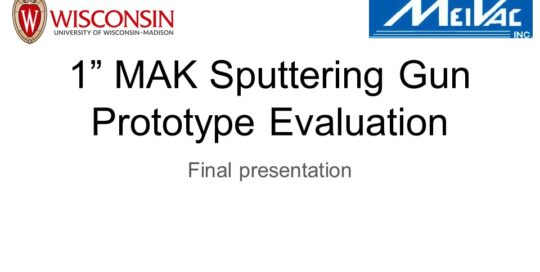All participants in the Materials Science and Engineering Capstone Project I and II courses, including students, faculty clients, and industry public or private clients, are encouraged to consider the following benefits and challenges prior to the start of student projects, so that any questions or concerns can be discussed prior to the formation and assignment of the project team.
Students gain numerous benefits from these projects. Students get an opportunity to develop their technical problem solving skills while working in a team environment, similar to “real world” engineers. The students are exposed to project management challenges, including time constraints, material availability, and technical limitations.
There are also many benefits for clients participating in the Materials Science and Engineering Capstone Project I and II courses. These benefits include closely interacting with students, getting access to potential future employees, exposing students to the client’s laboratory, company or industry, and getting input on specific projects suggested by the client. Many clients have had real problems solved by participating in the course.
However, these courses do lead to competing objectives. Everyone needs to remember that the paramount objective is the education of the students. The student participants are undergraduate students, so clients should understand that this course is not a “work for hire” program and that there are no guarantees that the students will be able to solve the specific problems of the project.
In addition, one of the course requirements is dissemination of information through course presentations and team meeting, websites, conference presentations, and possibly publications. Clients are encouraged to take appropriate steps to protect any confidential information that they determine is relevant to the team project. As part of the educational objective, the client can discuss with the students the appropriate safeguards to maintain the confidentiality of the sponsor’s information. However, clients need to remember that these are undergraduate students and to use prudence when disclosing any information to students. Clients should be aware that as a public institution, UW-Madison cannot agree to keep our work with each other confidential indefinitely.
Clients and students are also encouraged to discuss material, supplies and testing requirements for the project with their client to become familiar with the policies regarding the appropriate use of UW facilities, laboratory equipment, and safety procedures. All participants in the Materials Science and Engineering Capstone Project I and II courses, including students, faculty clients, and industry public or private clients, are encouraged to consider the following benefits and challenges prior to the start of student projects, so that any questions or concerns can be discussed prior to the formation and assignment of the project team.
Students gain numerous benefits from these projects. They get an opportunity to develop their technical problem solving skills while working in a team environment, engaging in true engineering practice. They also deal with typical project management challenges, including time constraints, material availability, and technical limitations.
Clients also gain numerous benefits from the projects. These benefits include closely interacting with students, gaining access to potential future employees, exposing students to the client’s laboratory, company or industry, and getting input on specific projects suggested by the client. Many clients have had real problems solved by capstone project teams.
However, everyone involved (students and clients) needs to remember that the paramount objective is the education of the students. Capstone is still an academic course, and the student participants are undergraduate students. Clients should understand that this course is not a “work for hire” program and that there are no guarantees that the students will be able to solve the specific problems of the project.
In addition, one of the course requirements is dissemination of information through course presentations and team meeting, websites, conference presentations, and possibly publications. Clients are encouraged to take appropriate steps to protect any confidential information that they determine is relevant to the team project. As part of the educational objective, the client can discuss with the students the appropriate safeguards to maintain the confidentiality of the sponsor’s information. However, clients need to remember that these are undergraduate students and to use prudence when disclosing information. Clients should be aware that as a public institution, UW-Madison cannot agree to keep our work with each other confidential indefinitely.
Confidentiality and intellectual properties are complex and evolving issues. Clients with specific concerns should contact the course coordinator for more detailed discussion.
Clients and students are also encouraged to discuss material, supplies and testing requirements for the project with their client to become familiar with the policies regarding the appropriate use of UW facilities, laboratory equipment, and safety procedures. On-campus material science laboratory equipment is available for projects at the following locations: Core College of Engineering Research Facilities, the Materials Science Center, and the Soft Materials Center.



